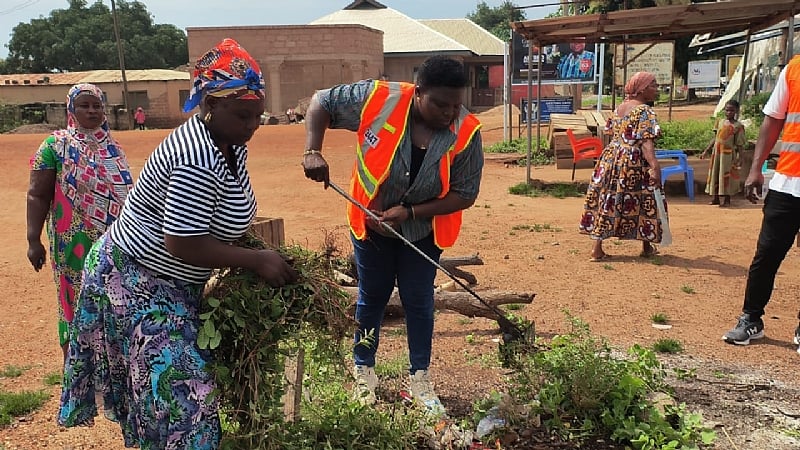The District Chief Executive (DCE) of Nadowli-Kaleo district in Ghana has set a powerful precedent for community leadership by actively participating in a sanitation drive organized by the National Service personnel. Donning a reflective vest and working alongside community members, service personnel, and other stakeholders, the DCE’s involvement transcended mere symbolism, demonstrating a tangible commitment to improving local sanitation. Her hands-on approach underscores the importance of leadership by example and serves as a potent catalyst for community-driven change. This act, if replicated consistently, holds the potential to significantly enhance the district’s sanitation and overall well-being. The DCE’s actions represent a crucial step towards fostering a culture of collective responsibility for hygiene and environmental cleanliness.
The context of this clean-up exercise highlights the pressing sanitation challenges faced by Ghana, including the Nadowli-Kaleo district. Experts warn against complacency, emphasizing that proactive sanitation measures are crucial to avert potential health crises. Waiting for another catastrophic outbreak like COVID-19 before prioritizing hygiene would be a grave mistake. The economic burden of disease treatment underscores the significance of preventative measures like proper sanitation. Maintaining clean environments is not just a matter of aesthetics; it’s a vital investment in public health and economic stability. The DCE’s participation in the clean-up serves as a stark reminder of the critical link between sanitation, public health, and economic prosperity.
The termination of Zoom Lion Ghana’s sanitation contract has shifted the onus of waste management back to local communities. This development emphasizes the importance of community-led initiatives like the one spearheaded by the National Service personnel in Nadowli-Kaleo. Their proactive approach to sanitation is commendable and underscores the vital role of community ownership in maintaining a clean and healthy environment. This initiative should serve as a blueprint for other communities and be institutionalized as a regular activity. It reinforces the crucial message that environmental hygiene is not solely the government’s responsibility; it requires the active participation of every citizen. The success of this clean-up drive highlights the potential of community-driven initiatives to address local challenges effectively.
The engagement of young people in this exercise is particularly noteworthy. Their involvement fosters a sense of civic responsibility and promotes the value of community service. Encouraging youth participation in such initiatives is crucial for cultivating a culture of environmental stewardship and ensuring the long-term sustainability of sanitation efforts. Equally important is the promotion of proper waste disposal practices. Indiscriminate dumping poses significant health risks and undermines the efforts to maintain clean environments. Public health experts emphasize that poor sanitation can trigger pandemics with devastating economic and social consequences, highlighting the urgent need for proactive waste management at the community level.
The DCE’s leadership in this sanitation drive serves as a timely and impactful reminder of the crucial role leadership plays in mobilizing communities towards positive change. By actively participating in the clean-up, the DCE demonstrated that sanitation is not merely a policy issue but a shared responsibility requiring the involvement of everyone, from community leaders to individual citizens. Her actions serve as a powerful symbol of commitment and inspire collective action towards a cleaner and healthier environment. The DCE’s direct engagement underscores the power of leading by example and sets a high standard for community leadership.
Her statement following the exercise, “Cleanliness is everyone’s responsibility. If we make it a habit, we will save lives, cut down health costs, and make Nadowli-Kaleo a model district in sanitation,” encapsulates the essence of the initiative. This simple yet profound message emphasizes the collective responsibility for sanitation and highlights its direct link to public health and economic well-being. The DCE’s words serve as a rallying cry for continued community engagement and underscore the potential of Nadowli-Kaleo to become a shining example of effective sanitation practices. This initiative should inspire similar efforts across other districts and contribute to a nationwide movement towards improved sanitation and public health. The DCE’s leadership and the community’s response offer a promising model for community-driven development across Ghana.


